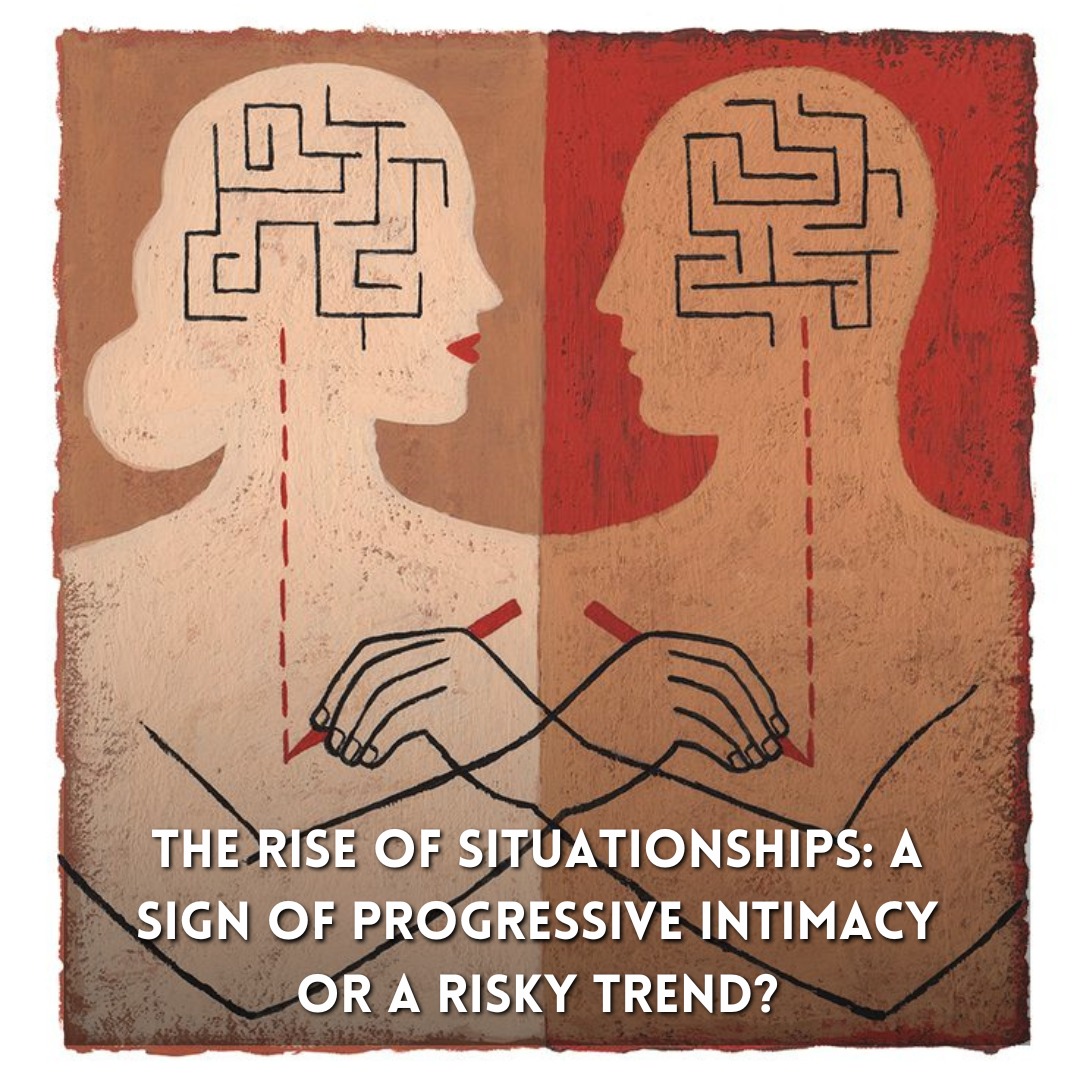–An Article by Poojan Patel
Contemporary times bring the contemporary relationships and with them their complex terminologies. The convergence of friends-with-benefits (FWB) arrangements and situationships has become a prevalent thing today or at least it’s what we are being told in the pop media culture. We have all heard about it, seen it from friends, or have been a direct or indirect part of it. To the unfamiliar, these terms denote connections that offer intimacy without the constraints of conventional romantic partnerships. The appeal lies in the freedom and flexibility supposedly provided by these non-committal arrangements, both rejecting traditional labels. However, beneath the surface, a paradox emerges – a reluctance to commit romantically coexists with the persistence of romantic feelings. Why, then, do we find ourselves entangled in a web of redundant names for relationships that supposedly defy romance?
Understanding these concepts and making sense of things in the context of situationships and FWB arrangements can be very difficult and a personal experience. This is just an attempt at understanding them in the context of modern or contemporary relationships.
Situationships and friends with benefits (FWB) have blurred the lines of traditional romance, introducing an imbalance between friendship and commitment. Usually, situationship exists in the gray area, a term coined to encapsulate the complexity of these modern entanglements. It’s a nebulous space between friendship and commitment, often involving emotional involvement without the clear boundaries of a defined relationship. Friends with benefits, on the other hand, imply a more straightforward connection with a focus on physical intimacy. The link between situationships and FWB lies in the blurred lines – both thrive in ambiguity, challenging traditional relationship norms and resulting in the ultimate hotpot of complex confused feelings.
This complexity mirrors the movie “No Strings Attached,” where characters Emma and Adam grapple with jealousy, showcasing how emotions can’t always be compartmentalized in these casual arrangements. Both situationships and friends-with-benefits relationships can be more than just physical, but they can vary on different degrees of emotional connection. In the movie “Friends with Benefits,” the characters start as friends, which shows that their relationship is based on friendship. Situationships, on the other hand, may involve emotional connections that go beyond the physical, making it difficult to tell the difference between friendship and romance.
Rom-coms like the above mentioned have painted a very romanticized picture where all ends well, but seldom that is true in reality. In such causal relationships as comedian Urooj Ashfaq puts it “one person is casual and the other is in the relationship”. After the situationship dissipates, it often leaves an emotional residue. Whether it evolves into a relationship or fades away, the aftermath is subjective.
This subjectivity and the ambiguity of these companionships can be knowingly or unknowingly very emotionally frustrating. Those who have been subjected to any of these types of intimate relationships may call it toxic. Labeling these dynamics as “toxic” oversimplifies. It’s more about evolving norms. These styles of companionship show us the nuances of Gen Z relationships, illustrating the challenges of fitting into societal molds. Labels provide a sense of security, and avoiding them in situationships and FWB relationships stems from a desire to escape societal expectations. Confusion arises when individuals seek clarity within inherently ambiguous dynamics.
The newer generation challenges traditional relationship structures while searching for true love as advertised in the mainstream media. The approach to love might be different but that craving for that human intimacy remains the same for all. Conventional relationships involve clear labels, defined roles, and long-term commitments. In the TV show “Modern Love,” various episodes depict unconventional relationships, mirroring the evolving perceptions of love.
One now might think what has love got to do with all the situationships and FWB companionships? Or is it just Lust that drives these forces? One may say that love and lust coexist in these dynamics. Love might start as lust, but it can grow. “Crazy, Stupid, Love” explores the messiness of love, reflecting how it can emerge unexpectedly even in seemingly casual connections.
Friends-with-benefits arrangements and situationships share similarities in constantly inventing new labels to escape emotional accountability leading to emotional ambiguity. Some might even call this out as a convenient way out to get validation. On the other hand, one argues that the subjective nature of convenience in situationships and friends-with-benefits (FWB) relationships is underscored by the inherent flexibility these arrangements offer. Unlike committed relationships, where expectations and responsibilities are often clearly defined, situationships and FWB dynamics thrive on a more fluid, less structured foundation. This fluidity can be appealing, providing individuals with the freedom to navigate their connections without the weight of traditional commitments. This very flexibility that can be liberating may lead to uncertainty, emotional ambiguity, and a lack of stability.
Pop culture often mirrors societal shifts and vice versa. We have seen through various TV shows and through personal experience that opening up emotionally can be very intimidating especially if one is in such a non-commitment arrangement. Certain social norms around these also hinder growth and discourage honest conversations. This leads to confusion on both parties’ ends. Even worse, it might be someone trying to satisfy their sexual partner out of a desire to form a connection even though they aren’t sure whether they want a relationship at all.
In this era of situationships and FWB relationships, the complexity of human connections unfolds in a variety of emotions. Whether driven by lustful immaturity or a lookout for mature love, the journey is a testament to the fluidity of human relationships, where lines blur, emotions intertwine, and the search for connection remains a deeply personal odyssey. Rather than focusing on these distinctions, perhaps it’s time to direct our attention to the commonality that binds them all: intimacy. In doing so, we may see a deeper understanding of the intricate and often confusing nature of modern connections.





